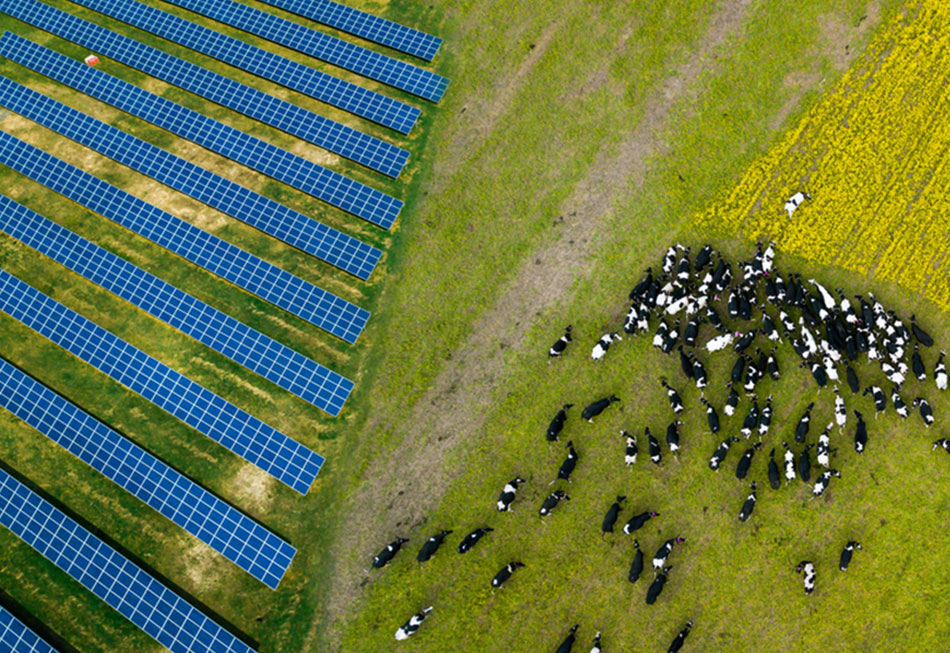
How Can Farmers Benefit From Solar, Battery and Off-Grid Solar Systems?
The rising costs of fossil fuels and unpredictability of the power grid have many in the agriculture industry looking into the benefits of solar systems for their farms. Whether you raise livestock or grow produce, solar power can help you reduce expenses while improving sustainability.
Watters Electrical is the largest solar company in Regional Victoria and Southern New South Wales. We’ve been operating since 1957 and strive to keep up with the ever-changing landscape of the electrical industry.
So in this post, we want to show you all the ways that we have seen farmers benefit from off-grid solar systems—and how you can get started too.
Does solar provide a return on investment for farmers?
Is it actually better for the environment?
We’ll answer all these questions and more.
Benefits of Solar for Agriculture
Although you may be intimidated by the upfront costs of installation, the advantages of solar powering your farm can’t be ignored. Here are the three biggest benefits you will enjoy.
Energy Cost Savings
The most practical reason to transition to solar power on a farm is monetary. Simply put, beyond the cost of maintenance and installation, solar energy is free. Rather than paying the energy company for every single watt you use, you are generating your own electricity from a source that never runs out: the sun.
Make efficiency Gains: obtain energy from renewable sources such as solar panels, wind and ground source heat pumps, where possible. Consider energy storage such as batteries and hot water buffer tanks – agriculture.vic.gov.au
Just how much can you save? The answer depends on the size of your operation, the extent of your solar system and numerous other factors. But, to give you an idea of the potential, let’s look at how solar power transformed the energy costs of one farm in the Mulwala / Yarrawonga area.
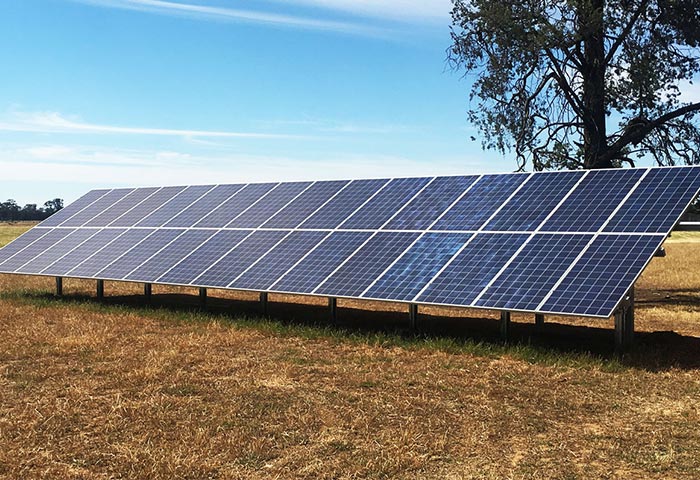
Environmental Sustainability
Saving money is even better when you are saving the environment at the same time. You already know that solar energy is greener than fossil fuels. But do you know how much greener?
According to one United Nations report, coal-generated energy produces about 200 grams of CO2 emissions per kilowatt hour, and gas a whopping 400 grams. Solar panels, on the other hand, produce as little as 25.
Sustainable farming goes beyond organic growing practices and water conservation. Transitioning to solar power is one of the best ways to show that your farm puts the environment first.
Reduced Reliance on the Grid
Especially in rural areas, relying on the grid can be troublesome. When you are at the end of the power line, an outage can leave you without electricity for days. With solar power, however, you don’t have to lose power just because the grid goes down.
Furthermore, you won’t be subject to fluctuations in electricity costs. And though you might worry that a cloudy day could power down your farm, an off-grid battery solution allows you to store energy for when you need it the most.
Solar Systems for Farms – Solutions and Use Cases
Now you know the primary benefits of solar power in the agricultural industry. Next, we’ll look at the most common ways that farmers use solar energy.
Rooftop Solar Panels
When most people imagine solar energy, they think of roofs lined with solar panels. While roof panels are usually the only option for residential Shepparton & Albury solar installs, they can work moderately well on farms as well.
The most important consideration is ensuring that the roof is in good enough condition to support panels. Beyond that, roof size may limit the amount of energy that can be collected. A commercial farm is going to have much higher electricity demands than a household. Therefore, roof panels alone aren’t likely to meet all of your solar power needs.
Still, especially for smaller farms, roof panels are a good way to harness the power of the sun without eating up acreage that could be used for planting or grazing.
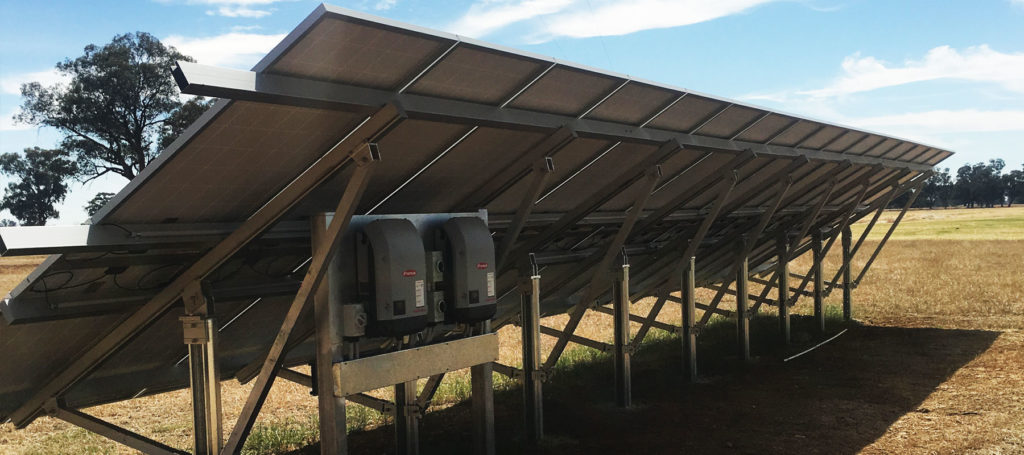
Ground Mount Solar Panels
The most common solar systems for larger farms don’t go on roofs, though. They are mounted directly into the ground. Ground mount solar panels provide a lot of benefits that make them ideal for agricultural use.
For starters, most farms have plenty of land to spare, so you can install as many panels as you need. You aren’t limited by roof space. Additionally, installing on the ground means that we can orient your panels in the optimal direction and angle to gather the most sunlight possible. Finally, ground mounted panels receive more airflow, which keeps them cooler and allows them to run more efficiently.
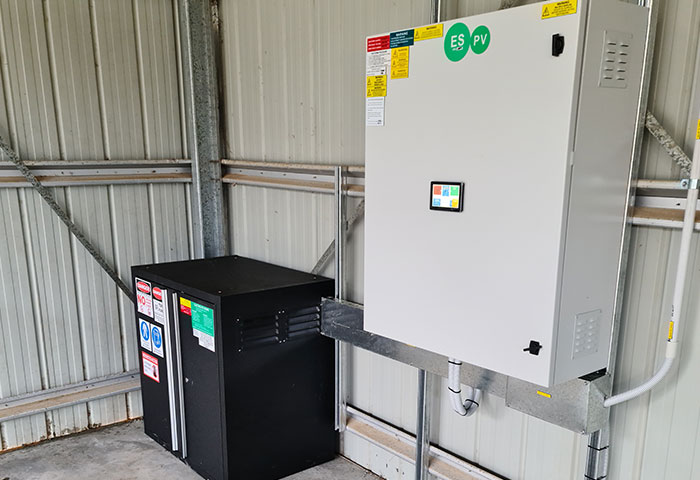
Off-Grid Solar Battery
No agricultural solar power system is complete without a battery. Your battery is what truly allows you to run your farm off-grid. The obvious downside to solar energy is that you can’t generate electricity at night or in cloudy weather. A properly selected and installed battery, however, allows you to store energy safely so that your farm can call on it any time of day.
Storing enough energy to power a farm can be a hefty task, though. The good news is that Watters Electrical specialises in off-grid battery systems of any size. From small, local nurseries to massive commercial farms, we have the expertise to find the most efficient power storage solution to meet your needs.
Refrigeration
Food spoilage can be a serious expense for farmers. When crops go bad before you can sell them, you are practically throwing money away. But refrigeration is also expensive, so it’s hard to justify the cost using grid electricity.
With solar-powered refrigeration, though, you can keep food fresh and prevent waste by harnessing the power of the sun. It’s not a must for every farmer, but if you find that spoiled food is a constant cost to your business, solar energy may be the solution.
Irrigation
A solar powered water pump is an ideal way to reduce the cost of irrigating crops or watering livestock. A common method is to pump water into a storage tank during daylight hours when you can collect energy, and then relying on steady drip irrigation to transport the water where it needs to go.
Solar water pumps also make it easier to relocate water around the farm. For example, you may have just a single natural water source that livestock tend to crowd. Too much activity around a watering hole can speed erosion and reduce water quality. By irrigating the water to several watering stations throughout your land, you can prevent both problems and make happier, healthier animals.
Lighting
Especially if you opt for LED lighting, there is a ton of potential for energy savings by using solar-powered light around the farm. You can illuminate sheds, barns, and even fields. You can power grow lights for seedlings. You can run a heat lamp for chickens on solar power. The possibilities are endless.
How to Transition to Solar Power for Your Farm
Watters Electrical has experience with industrial, commercial, residential, and agricultural solar systems of all sizes. If you are thinking that solar power for your farm is the way to go, let’s take a quick look at what the transition will look like.
Step 1: Energy Needs Assessment
The first thing we do is determine exactly what your farm needs in a solar solution. In addition to looking at your current energy load, we also work with you to answer questions like…
- How much of your energy needs do you want to power with solar?
- Do you have plans to expand your farm in the near future?
- What is your budget and how soon do you hope to see a return on investment?
With this information, as well as details about site dimensions and available land, the solar experts at Watters will design a system that meets your needs. And, if there are multiple variables fighting for your attention, we can even walk through several different proposals with you and help you weigh the costs and benefits of each.
Step 2: Choose Collectors, Inverters, and Batteries
Collectors are the solar panels that “collect” the energy from the sun. Our needs assessment will help us determine the size and number of collectors your farm requires. At this stage, our selection also depends on whether you will be using roof panels, ground mount, or both. Furthermore, we aim to find panels that will integrate as efficiently and safely with your existing electrical systems as possible.
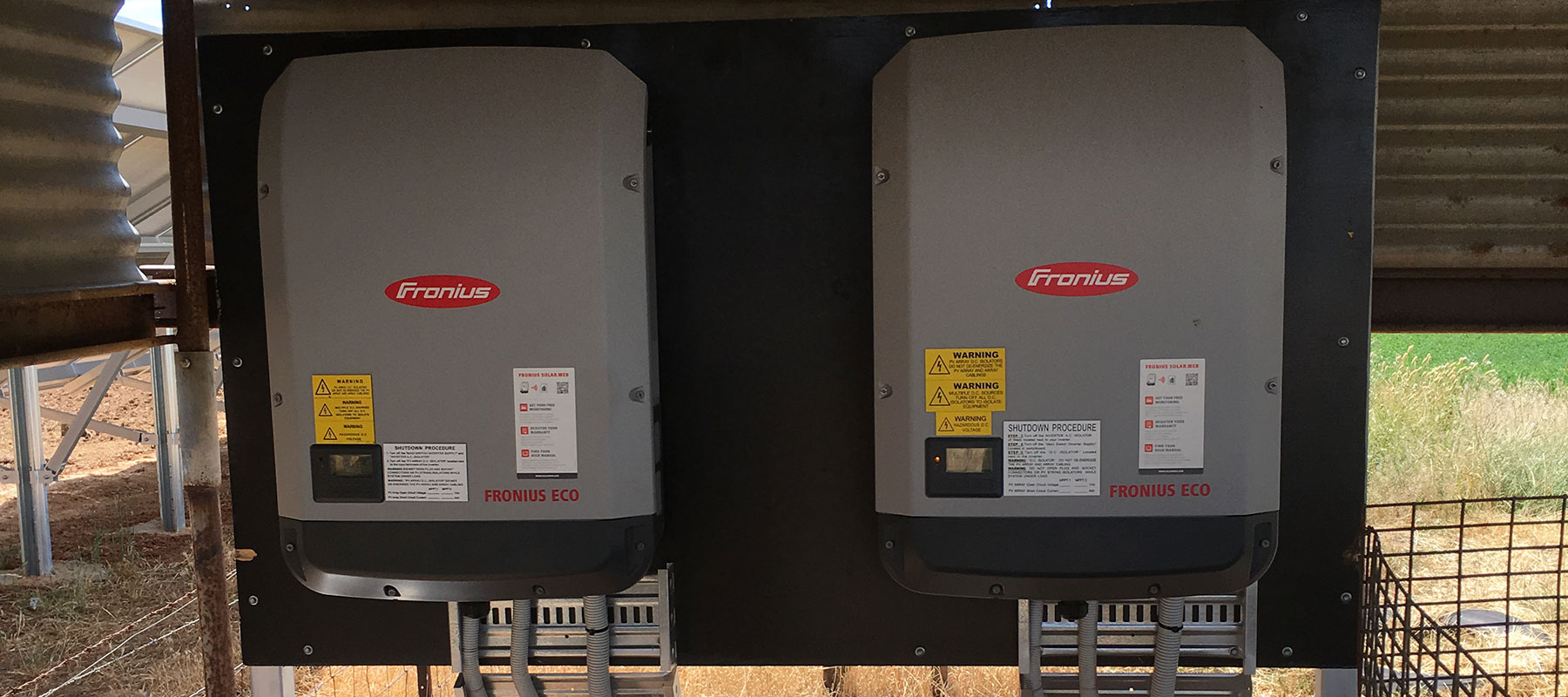
Inverters convert direct current (DC) into alternating current (AC). This is important because while the solar panels gather DC from the sun’s rays, your lights and other farm equipment run on AC. The right inverter for your farm’s solar system is one that can handle the amount of energy your panels are collecting. If your collectors are passing more voltage to the inverter than it is rated for, then the components may fail and suffer damage. Our job is to make sure this never happens.
Batteries, as discussed previously, are what allow you to run on solar power even when the sun goes down. We try to choose a battery system that will fit in with your energy demands. An efficient solar powered farm is one that always has some electricity stored away for a rainy day (literally!).
Step 3: Installation
Once all the parts are selected, our installation team gets to work. This is more than just screwing down panels and hooking up wires. When it comes to any sort of electrical work, safety is a top priority. We ensure that your solar system is free of hazards. Furthermore, a key part of installation is calibrating every component to connect with your existing electrical system, run efficiently and meet the energy needs of your farm.
Let Watters Electrical Find the Best Solar System for Your Farm
Watters Electrical is the largest solar company in the region, equipped for agricultural projects big and small. Whether you are looking to power a single chicken coop or bring an entire commercial farm 100% off-grid, we are here to help.
Fill out our easy online solar quote form or call 1300 WATTERS to get started today!
Simply complete the below for a Free Quote and Power Requirement Assessment from your local Watters Solar Power & Off Grid Specialists.

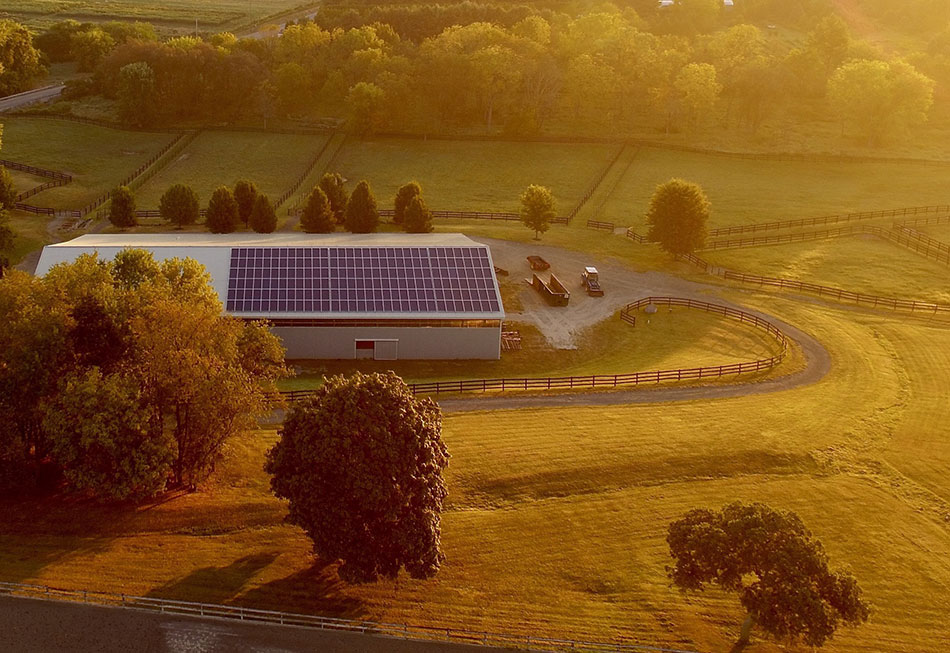
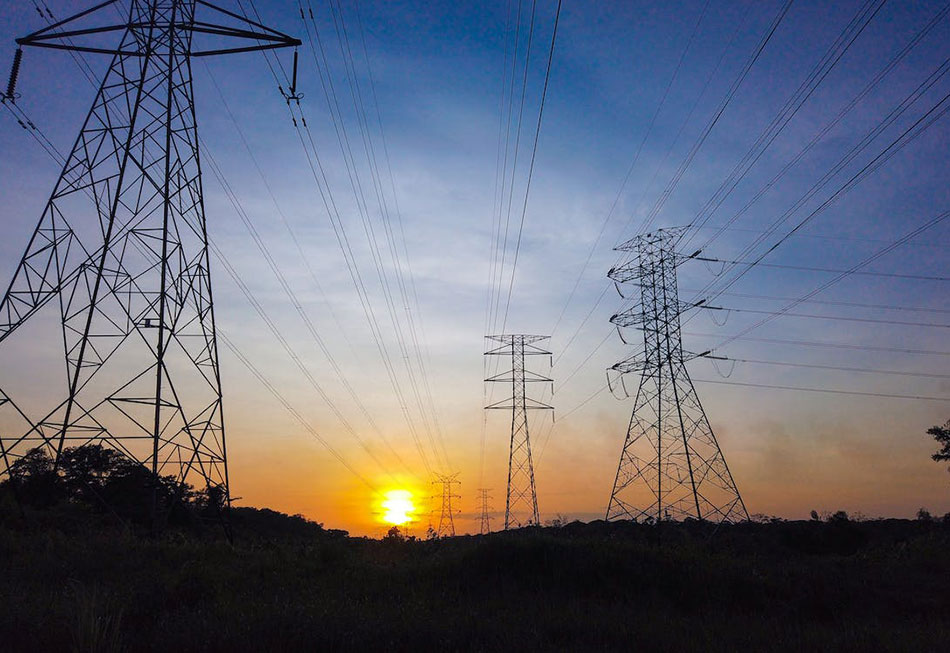

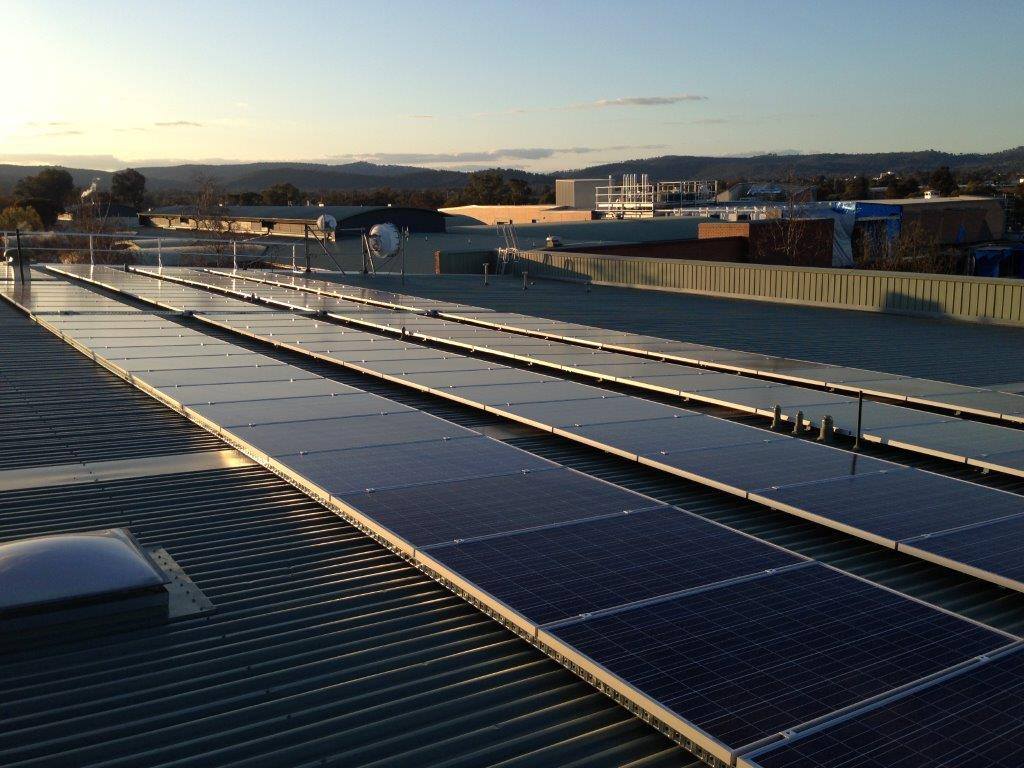
This Post Has 0 Comments